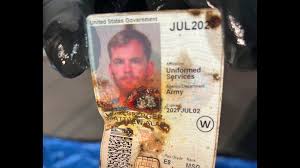Tragedy Strikes: Cuyahoga Falls Man Linked to Las Vegas Bombing Incident
 In a shocking turn of events, a man with deep-rooted ties to Northeast Ohio has been identified as the prime suspect in a bombing incident outside Trump Tower in Las Vegas. Matthew Livelsberger, 37, was found deceased following the explosion, believed to have detonated explosives inside a rented Tesla Cybertruck. The news has left the community in Cuyahoga Falls, where Livelsberger owned a home, grappling with disbelief and concern.
In a shocking turn of events, a man with deep-rooted ties to Northeast Ohio has been identified as the prime suspect in a bombing incident outside Trump Tower in Las Vegas. Matthew Livelsberger, 37, was found deceased following the explosion, believed to have detonated explosives inside a rented Tesla Cybertruck. The news has left the community in Cuyahoga Falls, where Livelsberger owned a home, grappling with disbelief and concern.
Livelsberger’s connection to Ohio is significant. He graduated from Bucyrus High School in 2005 and served in the military, where he reached the rank of master sergeant within the elite Green Berets. His military career spanned several years, from active duty in 2006 to 2011, followed by time in the National Guard and Army Reserve.
Reports indicate that Livelsberger purchased a home in Cuyahoga Falls in 2019, a residence that has since come under scrutiny as investigators delve into the circumstances surrounding the bombing. Neighbors expressed surprise at the news, with one stating she had never met or interacted with him. Property records reveal that Livelsberger’s mother resides at the home, which prominently displays a blue star flag—an emblem of military service that signifies a family member’s active duty.
The events that unfolded in Las Vegas on Wednesday morning were tragic. Livelsberger’s explosion resulted in his death and left seven others injured. Authorities reported discovering gas canisters, camping fuel, and firework mortars in the truck’s bed after the fire was extinguished, raising questions about the nature of the incident. However, investigators have yet to determine how the explosion was ignited, as no devices that could have triggered it were found at the scene.
While the motive behind Livelsberger’s actions remains unclear, it has been revealed that he was on approved leave from his military duties at the time of the incident. The U.S. Army Special Operations Command (USASOC) has stated that they are cooperating fully with federal and state law enforcement agencies, emphasizing their commitment to the ongoing investigation.
Livelsberger’s military background adds layers of complexity to the situation. As a member of the Green Berets, he was trained to counter terrorism and engage in unconventional warfare. This raises pressing questions about his mental state leading up to the bombing, as well as potential connections to broader issues of violence and mental health among veterans.
Interestingly, Livelsberger served at the same military base as Shamsud-Din Jabbar, a man suspected of driving into a crowd in New Orleans in 2021, resulting in the deaths of 15 individuals. However, the FBI has clarified that there is no definitive link between the two cases, underscoring the need for careful investigation into the motives and circumstances surrounding Livelsberger’s actions.
 As news of the bombing spreads, community members in Cuyahoga Falls and beyond are left to process the implications of this tragedy. Conversations about mental health support for veterans, the impact of military service on individuals, and the potential for violence in seemingly ordinary lives are becoming increasingly urgent. The situation has prompted reflection on how communities can better support those who have served, addressing the underlying issues that may lead to such devastating outcomes.
As news of the bombing spreads, community members in Cuyahoga Falls and beyond are left to process the implications of this tragedy. Conversations about mental health support for veterans, the impact of military service on individuals, and the potential for violence in seemingly ordinary lives are becoming increasingly urgent. The situation has prompted reflection on how communities can better support those who have served, addressing the underlying issues that may lead to such devastating outcomes.
In the wake of this event, local authorities and organizations may need to step up efforts to provide resources for mental health support, ensuring that veterans and their families have access to the help they need. The community of Cuyahoga Falls, which has been shaken by this tragedy, must come together in solidarity to support one another and engage in meaningful conversations about preventing similar incidents in the future.
As investigators continue to piece together the details surrounding the Las Vegas bombing, the life and actions of Matthew Livelsberger serve as a poignant reminder of the complexities surrounding mental health, military service, and the potential for violence. This tragedy will undoubtedly resonate within the community and the nation, prompting a reevaluation of how we support those who have served in the armed forces.
Sources: